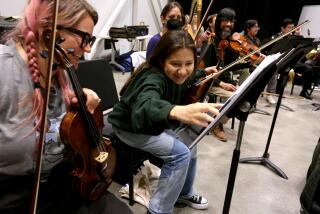SITKOVETSKY CONFRONTS THE SHADOW
- Share via
Now that the U.S.-Soviet cultural exchange turnstile is operating again, would Dmitry Sitkovetsky follow the example of Vladimir Horowitz and prove you can go home again?
“Although I would love to go there, to play for my childhood friends,” he says, “it would be a little spooky--like returning to a previous lifetime.”
But there’s more. Should he be invited, the 32-year-old Soviet-born violinist (who appears as soloist with the Los Angeles Chamber Orchestra at Ambassador Auditorium tonight) would have to deal not only with the ghost of his former self, but the ghost of his father as well.
Julian Sitkovetsky was, from all reports and a few recordings, a dazzling violinist. He died of cancer in 1958 when he was 32.
Though he carries few memories of his father (he was 3 1/2 when Julian died), the younger Sitkovetsky senses that something has been carried over: “I think I inherited a certain intensity from him.” Photographs reveal a striking physical resemblance, too. But, Dmitry quickly adds, “My mannerisms are different. I’m a different musician.
“I’ve heard stories about his playing. He apparently had quite an impact on others. Still, I am trying to separate myself from being his son.”
Displaying an amiable self-confidence and an unassuming air during a telephone conversation from his New York home, Sitkovetsky shows no reluctance to discuss yet another dominating musical figure in his life--his mother, pianist Bella Davidovich.
Far from viewing the two giant musical shadows of his parents as inhibiting forces, Sitkovetsky relishes his good fortune. “I am in an advantageous position,” he suggests. “I was in a professional atmosphere from early on. When I started at Juilliard (in 1977, a year after emigrating to Israel), I was far, far ahead in ear training.”
Perhaps the best evidence that Sitkovetsky holds no parental grudge is his occasional choice of a pianistic partner.
“It is a great responsibility performing with my mother. But I assure you, we never play up to an audience’s response to us as mother and son. We play as partners.”
The two made their New York debut together last month and will play their first Los Angeles joint recital in April, 1987, at Ambassador.
“We concertized together quite often in Russia, starting in 1973,” he recalled. His subsequent emigration put all that on hold, of course. Why did he leave?
“I suppose if I had remained, I would be playing throughout Europe and Russia today, and teaching at the Moscow Conservatory. I’d have a family (he is married, with no children).
“But I would not be making artistic decisions myself. I would be serving the system. When you have to get approval for just about everything--every trip, every decision you make--it degrades you as a human being. And if I had defected, it would have been lethal for my mother. They would never have let her out.” (Davidovich was allowed to follow her son in 1978).
Will the situation in the Soviet Union change? “The government is concerned about losing a lot of talent, a lot of potential,” he theorizes. “They’re also losing a lot of hard currency.
“I understand from friends that things have loosened up since I left. Of course, everything is relative.”
More to Read
The biggest entertainment stories
Get our big stories about Hollywood, film, television, music, arts, culture and more right in your inbox as soon as they publish.
You may occasionally receive promotional content from the Los Angeles Times.










